The Best Goat Milk Formula For Babies (2025 Guide)
This post may contain affiliate links. As an Amazon Associate, I earn from qualifying purchases. Please read my disclosure.As a certified nutritionist, health coach, and mom of two, I’ve spent over a decade researching infant nutrition and evaluating formulas. I know that choosing the right baby formula can feel overwhelming, especially when you’re considering goat milk options!
My comprehensive guide reflects my experience and research: it’s your evidence-based, parent-friendly resource to help you decide whether goat milk formula is right for your baby, what to look for and what to avoid, and how to choose which brand is best for your family.

So many of you have come across my best organic baby formula post, and I’m so glad that post has been helpful! One of the most common questions I get when it comes to baby formula is: What about goat milk formula? Is it better than cow’s milk formula? And which one is the best?
And it’s no surprise – goat milk formulas are gaining popularity for a reason. They can be gentler on tiny tummies, are naturally rich in nutrients, and contain A2 milk proteins that may be easier to digest than the A1 proteins found in cow’s milk.
But not all formulas are created equal. That’s why I evaluated every goat milk formula available today, from Europe to the U.S., and created my recommended list of the best goat milk formulas based on ingredient quality, safety standards, digestibility, and real-world results from thousands of parents.
In this guide, you’ll learn:
- When goat milk formula might be a better choice than cow’s milk
- What makes a high-quality goat milk formula (and what to avoid)
- A detailed comparison of the best formulas available today
- Which brands I’d personally trust for my own kids
📝 My Review Process & A Quick Note Before We Dive In
As a nutritionist and board-certified health coach, I base all my recommendations on current scientific research, expert consultations, and my personal experience feeding two formula-fed babies. I have thoroughly vetted every product in this guide, both for ingredient quality and real-world performance. This post has also been medically reviewed and fact checked by Katie Drakeford, MA, RD, CSP, LD, CLC (see my about page for more info about Katie).
This post is for informational purposes only and should not replace medical advice. Every baby is unique, so be sure to speak with your pediatrician before starting or switching formulas. My recommendations are not a substitute for professional medical advice, diagnosis, or treatment.
Some links in this post are affiliate links, which means I may earn a small commission if you purchase through them, at no extra cost to you. I only recommend products I would personally use with my own children. Thank you for supporting this blog and helping me continue to provide science-backed guidance for families like yours!
🐐 What Is Goat Milk Formula?
Goat milk formula is infant formula made from goat’s milk instead of cow’s milk. It’s carefully modified to match the nutritional profile required for babies, including protein, fat, carbs, vitamins, and minerals, so it’s safe for newborns when labeled as an infant formula.
While regular goat milk naturally contains more casein and less lactose than cow milk, it still needs to be processed and fortified to meet your baby’s needs. That’s why the formulas in this guide are different from regular goat milk, they’re specifically designed for infants. (Infants shouldn’t be given regular goat milk or cow’s milk until after 12 months of age).
There are also toddler versions of goat milk formula, meant for children 12 months and up. These can be great for weaning or supplementing a toddler’s diet with extra healthy fats and nutrients, especially for toddlers who are pickier eaters.
I recommend checking labels carefully, because not all goat milk formulas are approved for infants. If you’re unsure, talk to your pediatrician to find the right fit for your baby’s age and digestion
🍼 What Are The Benefits Of Goat Milk Formula?
As a nutritionist and mom, I’ve found that goat milk formula can be a great option, especially for babies who struggle with digesting cow’s milk formula. While it’s not hypoallergenic, goat milk offers several unique benefits that can make it a better choice.
Here’s why some families use it:
- Easier digestion: Goat milk contains mostly A2 casein proteins, which may be gentler on the gut than the A1 proteins found in cow’s milk. It also forms a softer curd in the stomach, which some babies tolerate better.
- Naturally rich in prebiotics: Goat milk is high in oligosaccharides, prebiotics that support healthy gut bacteria, similar to what’s found in breast milk.
- Fewer digestive symptoms: Thanks to smaller fat globules and more medium-chain fatty acids, goat milk is easier to break down, which may reduce gas, spit-up, or constipation in some babies.
- Anti-inflammatory properties: The oligosaccharides in goat milk may also support a stronger immune response and reduce inflammation in the gut.
- Potential for fewer skin reactions: Some studies have found lower rates of eczema in babies fed goat milk formula compared to those on cow’s milk-based formulas.
It’s important to note: These benefits can vary from baby to baby. Goat milk formula isn’t a guaranteed fix, but for the right child, it can make a noticeable difference in digestion and overall comfort For even more details, check out my list of the top 10 benefits of goat milk formula for babies.
🥛 How Is Goat Milk Formula Different From Cow’s Milk Formula?
If your baby isn’t tolerating cow’s milk formula well, goat milk might offer a gentler alternative, but the two types of formula are actually quite similar in overall nutrition. The key differences come down to digestibility and how your baby’s body handles the proteins, fats, and sugars in each milk type.
Here’s how goat milk formula compares:
- A2 vs. A1 Proteins: Goat milk naturally contains more A2 beta-casein, a protein that’s often easier to digest and less likely to cause inflammation than the A1 beta-casein found in most cow’s milk.
- Fat Composition: Goat milk has smaller fat globules and more medium-chain fatty acids, both of which are easier for babies to break down and absorb. This also results in softer curd formation in the stomach, which may reduce discomfort, gas, or constipation in some babies.
- Lactose Content: Goat milk contains slightly less lactose than cow’s milk, which can be helpful for babies with mild lactose sensitivity (though not appropriate for babies with true lactose intolerance).
- Natural Nutrients: Goat milk is naturally rich in vitamin A, calcium, and essential fatty acids, though both goat and cow milk formulas are fortified to match ideal nutrition for infants, regardless of the milk source, so this isn’t a major difference.
- Taste & Texture: Goat milk formula tends to be creamier and mildly sweeter. Some babies love the taste, others may not!
One thing to keep in mind: While goat milk can be easier to digest for many babies, it’s not hypoallergenic and is still considered a dairy formula. Always check with your pediatrician before making a switch, especially if your baby has a diagnosed milk allergy or persistent digestive issues.
For more details on what the pros & cons are of goat milk vs. cow milk formula, check out my guide to goat milk formula vs. cow’s milk formula.
🤔 Is Goat Milk Formula Better For Babies?
In my experience as both a nutritionist and a mom, the short answer is: it depends. Goat milk formula can be a fantastic option for some babies, but it’s not automatically better than cow’s milk formula for everyone.
Here’s what I tell parents when they’re deciding between the two:
- Goat milk formula may be easier to digest for some babies due to its A2 proteins, smaller fat globules, and softer curd formation in the stomach.
- It can be a great alternative if your baby struggles with gas, constipation, or mild digestive discomfort on cow’s milk formula.
- It’s not hypoallergenic. Goat milk still contains dairy proteins and lactose. If your baby has a diagnosed cow’s milk protein allergy (CMPA) or true lactose intolerance, goat milk formula likely isn’t the right fit.
Some babies thrive on goat milk formula from day one. Others may not love the taste or may get constipated on it. And for babies who do well on cow’s milk formula, there’s usually no need to switch.
👉 Bottom line: There’s no universal “best” formula. It comes down to your baby’s individual needs and your pediatrician’s guidance. If cow’s milk formula isn’t working and you want a gentle, nutrient-rich alternative, goat milk formula might be worth trying.
⭐️ Ideal Goat’s Milk Formula Ingredients
As a mom who formula fed my own two kids, I know how overwhelming formula labels can be. But once you know what to look for, and what to avoid, it gets much easier to make a confident choice. Here are the ingredients I prioritize when evaluating goat milk baby formulas:
✅ Organic or Non-GMO Sourcing: Formulas made in the EU or New Zealand typically have stricter organic standards and better animal welfare practices. Holle, Jovie, and HiPP are excellent examples.
✅ Lactose as the Primary Carbohydrate: The main carbohydrate in breast milk is lactose, so I prioritize formulas that also only use lactose. It’s best to avoid added sugars like glucose syrup, corn syrup solids, or maltodextrin.
✅ Balanced Whey-to-Casein Ratio (Ideally 60:40): Goat milk naturally has more casein (about a 20:80 whey:casein ratio), which can be harder to digest. Brands that add extra whey (like Kendamil) make their formula easier on little tummies. Another alternative is for formula brands to add healthy fats and prebiotics, as Jovie does, to aid in smooth digestion despite the whey-to-casein ratio.
✅ Omega-3 & 6 Fatty Acids (DHA & ARA): These support brain and eye development. I look for cold-extracted or non-hexane-sourced DHA wherever possible.
✅ Prebiotics and/or Probiotics: Prebiotics help feed good gut bacteria. Ideally, probiotics are added as well, but you can also supplement with probiotics for formulas that don’t contain it, whereas it is much harder to supplement with prebiotics for infants.
✅ No Highly Processed Additives: I avoid formulas with carrageenan, synthetic preservatives, hexane-extracted ingredients, and soy protein isolate.
✅ Smooth Texture and Easy Mixing: Creamy, lump-free formulas are more palatable and easier to digest.
👉 Note: Some ingredients like palm oil or soy lecithin aren’t ideal but aren’t necessarily deal-breakers. If your formula meets most of the above and works well for your baby, that’s what matters most.
🚫 Ingredients To Avoid In Goat Milk Formula
Over the years, I’ve reviewed dozens of formulas and these are the ingredients I consistently recommend avoiding:
❌ Synthetic DHA & ARA: While DHA and ARA are important nutrients found in breast milk, many formulas use versions extracted with hexane, a chemical solvent. Look for formulas that use non-hexane or water-extracted sources instead.
❌ Genetically Modified Organisms (GMOs): Always look for formulas labeled non-GMO or certified organic, which ensures they’re free from genetically modified ingredients and pesticide residues like glyphosate.
❌ Carrageenan: This thickening agent is banned in Europe for use in infant formula due to its link to gut inflammation (source). Unfortunately, it’s still allowed in the U.S., so double-check labels if you’re buying domestic brands.
❌ Soy Protein Isolate: While soy oil is sometimes necessary, soy protein is more highly processed and may interfere with hormone development in infants when consumed regularly (source).
❌ Palm Oil: Found in many U.S. formulas, palm oil can cause digestive issues and may reduce calcium and fat absorption. While hard to avoid entirely, I consider it a yellow flag, better to skip when possible
🏆 Quick Picks: Best Goat Milk Formulas (2025)
If you’re short on time, here are my top recommendations at a glance. Further down in this guide, you will find a detailed list of the best goat milk formulas and why I love each of these options.
- Best Overall: Jovie Goat Milk Formula. Organic, made with whole goat milk, and free from palm oil and soy. Includes DHA (from fish oil) Clean, creamy, and gentle.
- Best Budget-Friendly Option: Aussie Bubs Goat Milk Formula. Non-GMO, clean-label certified, and comes in either 0-12 month option at Target, or a stage 1/2 option online.
- Best Toddler Formula: Kabrita USA Goat Milk Toddler Formula. Nutrient-dense, easy to digest, and widely available in the U.S.
- Best Whole Milk Base: Kendamil Goat and Nanny Care. A2 protein, contains DHA, no palm oil or fish oil, and mimics breast milk’s whey:casein ratio.
- Best European Option: HiPP Dutch Goat Milk Formula. Organic, and known for gentle digestion.
- Best With Prebiotics: Kabrita Infant Formula. Includes GOS prebiotics, DHA, ARA, and a whey-to-casein ratio similar to breast milk.
- Best Established Brand: Holle Goat Milk Formula (German) and Holle Goat Formula (Dutch). Organic and Demeter-certified, formula makers for 85 years, slightly lower in digestibility.
- Best Vegetarian Formula: Kendamil Goat. No fish oil, and uses plant-based DHA and ARA.
- Best Non-European Option: Kabrita USA or Aussie Bubs. U.S.-friendly formulations with high safety standards and clean sourcing.
I chose these formulas based on: over 100 hours of research, speaking with thousands of parents on what has worked for their children, personal experience with my own two kids, reviewing the ingredients of every goat formula brand on the market, speaking with doctors and pediatricians, and reviewing countless articles and peer-reviewed studies.
🔍 The 10 Best Goat Milk Formulas (Details)
My list below dives into the 10 best goat milk formulas on the market today and the pros and cons of each! Just click on the product name to see my preferred reliable formula distributor for that particular brand.
❓Goat Milk Formula FAQs
No, regular goat milk is not safe for babies under 12 months. Goat milk on its own doesn’t have the right balance of nutrients, so it must be heavily modified to become infant formula. Goat milk formula is carefully designed to meet babies’ nutritional needs, just like cow’s milk formula. Always consult your pediatrician before offering any new formula.
Yes! Goat milk formula that meets FDA or European Commission standards is considered safe for infants. These formulas go through rigorous testing to ensure they contain the correct balance of protein, fat, vitamins, and minerals for your baby’s growth and development.
Some babies with mild dairy sensitivity do better on goat milk formula because it contains A2 milk proteins and is easier to digest. But for babies with true CMPA, goat milk would likely still trigger a reaction. Most babies with CMPA need a true hypoallergenic formula, and since goat milk formula is not considered hypoallergenic, it’s important to talk to your pediatrician before trying it if your baby is diagnosed with CMPA.
Yes, you most definitely can purchase goat milk formula in the United States. Kendamil Goat Milk Formula and Bubs Stage 1 Goat Milk Formula are both for sale at Target stores. Others, like Jovie or Holle, can be imported from Europe through reputable retailers. Availability has expanded significantly since the 2022 formula shortage.
Some are, some aren’t. The FDA doesn’t “approve” infant formulas, but they do regulate infant formulas. Some brands like Kabrita USA, Aussie Bubs, and Kendamil are FDA-regulated under import programs like Operation Fly Formula, and others are regulated either by the European Commission (for European baby formulas) or the equivalent regulatory body in the country the formula is produced in.
Goat milk has some similarities to breast milk, including prebiotic content and A2 proteins, which can support easier digestion. But it still has a different fat and protein composition and must be fortified to meet infant needs. No formula is an exact match for breast milk, but many goat milk options are thoughtfully designed to be as close as possible with a whey:casein ratio that matches mature breastmilk.
💡More Helpful Formula Guides!
- Best Vegan Baby Formula
- Benefits Of Goat Milk Formula
- Best Baby Formula For Colic
- How To Transition From Breastmilk To Formula
- Best A2 Baby Formula
- Best Toddler Formula
- Kabrita Goat Milk Formula Review
- Jovie Goat Milk Formula Review
💭 Final Thoughts
I hope this guide helped make goat milk formula feel a little less overwhelming and a lot more approachable. As a nutritionist, mom of two, and someone who’s spent countless hours researching formulas, I truly believe goat milk formula can be a wonderful option, especially for babies with mild sensitivities or digestion issues.
Every baby is different, and there’s no one-size-fits-all answer. What matters most is that you feel informed and empowered in your decision. Whether you choose Jovie, Kendamil Goat, Kabrita, or another trusted brand on this list, you’re doing the best you can for your little one, and that’s what counts most.
If you’re still unsure where to start, Jovie is my top recommendation for its clean ingredients, whole A2 goat milk base, and overall nutritional profile. But any formula you choose from this list is one I’d feel confident feeding my own kids.
If you have any questions or want to share your experience with goat milk formula, feel free to drop a comment below, I’d love to hear from you and I respond to every comment and question I get!
Love this helpful guide? Feel free to leave any comments or questions in the comment section further down the page!
You can also FOLLOW ME on FACEBOOK, INSTAGRAM, and PINTEREST to see more delicious, healthy, family-friendly food, and if you have any questions, I’m here to help!



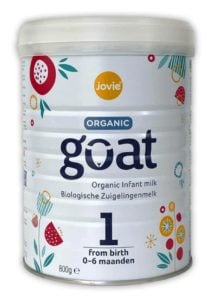
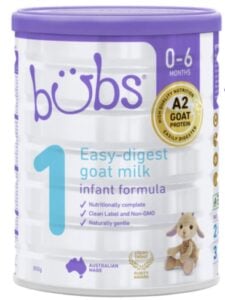
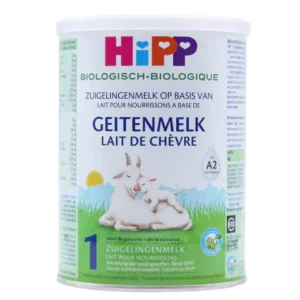
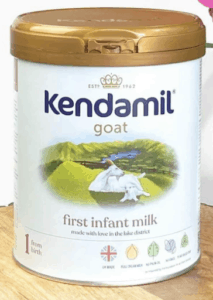
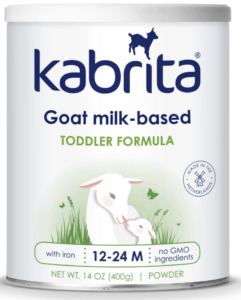
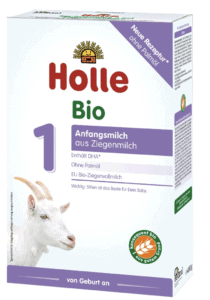
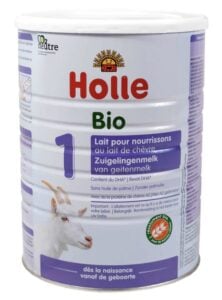
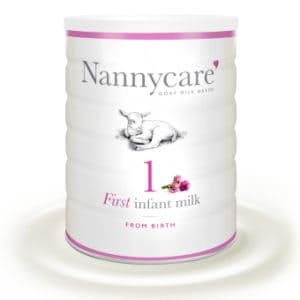
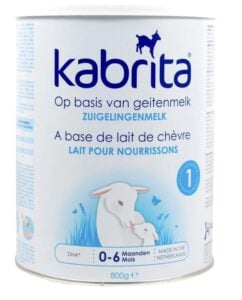
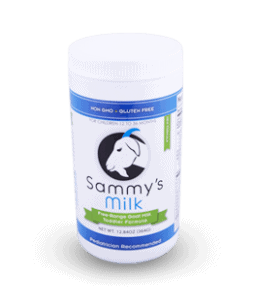


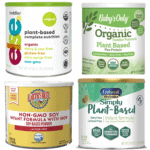

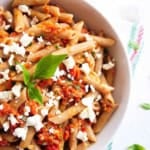
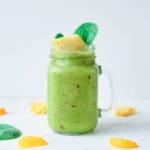



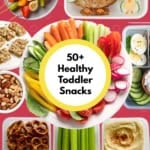


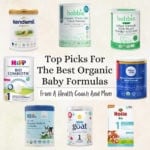



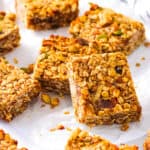


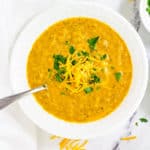
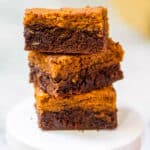
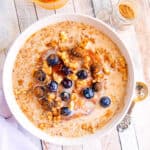



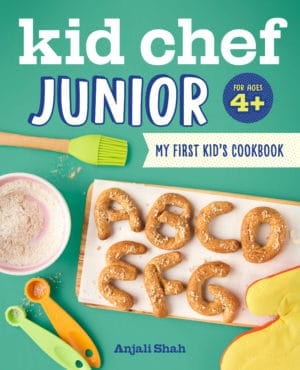


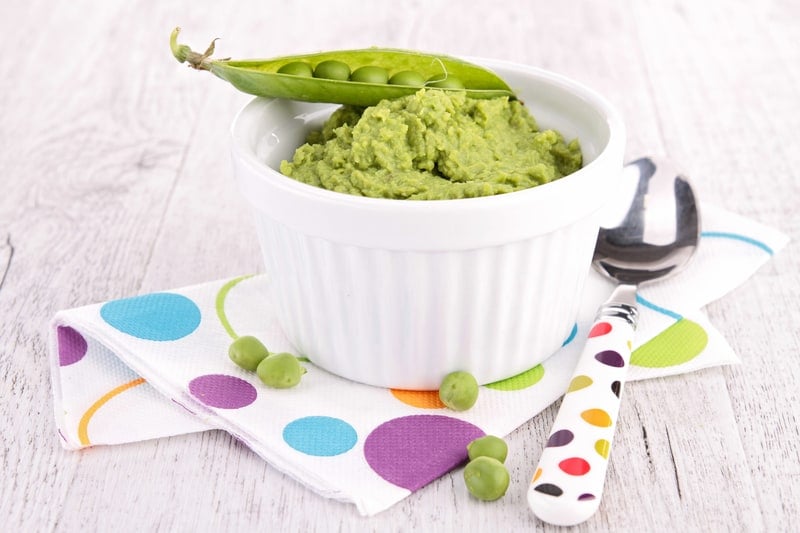
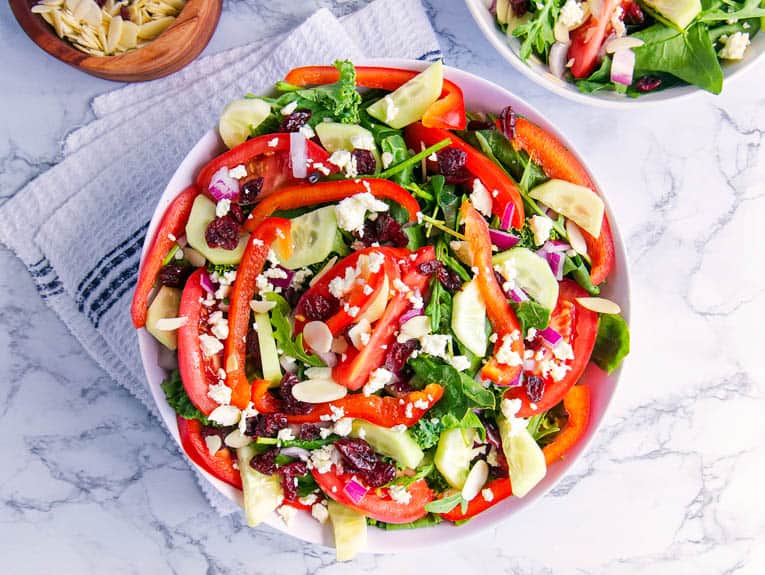


Hi again,
Kendamil Goat stage 1 is back in stock but I am still deciding between starting my EBF baby on Kendamil Goat stage 1, Jovie or Loulouka goat stage 1. I can’t decide which would be best to supplement. Thank you so much!
Hi Alex! I would go with Jovie, I actually think it’s better than Kendamil since it’s organic and is way easier to purchase (there is more stock of it!) If you’re looking for a more affordable option, Loulouka Goat is my second runner up to Jovie and is more affordable for sure. Hope that helps!
Have you heard of Jovie goat milk formula? I have Kendamil Goat stage 1 but having a hard time finding it so I was suggested to try Jovie? My baby is breastfed but looking to combo feed at 6m.
Hi Alex! I have heard of Jovie and it’s great! I would feel comfortable using it for my kids if they were still on formula. I’m working on an update to this post that includes Jovie and also a separate post about Jovie that goes into detail about its benefits so stay tuned for that! But in the meantime, I think it’s definitely a fine alternative to Kendamil Goat. Hope that helps!
Thank you so much!
Sure thing! 🙂
Kabrita is great stuff! Our daughter struggled on cow’s milk based formula and we gradually switched her to Kabrita (always talk to your doctor first!) and she did so much better on it. Anybody who wants to find out why we picked Kabrita can read our story over here: I’m so glad to see Kabrita on your list. Our daughter was adopted as an infant and I wasn’t able to breastfeed her, so she had to be on formula. She had a hard time on cow’s milk-based formula, so we gradually moved her to Kabrita (always consult your doctor, as we did!). When I had any questions I was able to reach out to the people at Kabrita, and found them to be very helpful. You can read our formula story here: https://giveagirlagoat.com/goat-milk-formula-is-an-option-for-baby/
So glad to hear that Kabrita worked for you!! That’s so great!
Going to start some formula and wondering if I should try goat instead of cow because it is easier to digest. He is EBF so I don’t know if he has gut issues or allerigies. I am lactose intolerant myself. Should I try organic cow milk formula first to see? Or should I try organic goat milkformuka right away?
Hi Jaimie! Honestly it’s just personal preference!! Goat is easier for some babies to digest but not for all babies. So it might be worth starting with cow’s milk formula if you’re not concerned about allergies, and switch to goat if he doesn’t do well on cow milk formula! When you do transition to formula (no matter which one you pick) make sure to do it slowly, over a period of 1-2 weeks – so it doesn’t “shock” your baby’s system. Hope that helps!
Hello I have a question when you say transition baby 1-2 weeks so it doesn’t shock him what do you mean by that ? Do you recommend a certain ounce at a time or a certain amount of bottles at a time? Thank you
Hi Carmina! I mean like if you are doing 5 6oz bottles a day, on the first day, you probably only want to add 1 oz of the new formula into each bottle + 5oz of the old formula; the next day 2oz new + 4oz old, the next day 3oz new + 3oz old, etc. — that’s if you were doing it over 1 week. If you were doing it over 2 weeks, then you’d increase by 1/2 oz increments in each bottle each day. Hope that helps!
I started using little oak. Thanks to the mamma that posted about it. It’s much little than holle and seems more digestible for my guy. The company has great customer service abs arrives in a few days. Great option so thank you for this!
Great to hear – glad you found something that works for your baby!!
Are you saying that Kabrita doesn’t have glucose syrup solids, taurine, and l-carnitine? Because it does. I’m looking at their infant formula right now and it has all 3 of the things you said to look for that we shouldn’t want them to have. So, I’m confused now by this entire blog.
Hi there! This blog post is about Kabrita USA – the toddler formula that also meets infant nutritional requirements. I actually do not recommend Kabrita’s Infant Formula (which is available in the EU but is a completely different product – and that’s the formula you are thinking of). Kabrita USA has no glucose syrup solids or synthetic ingredients. Hope that helps clarify things!
Hi there!
I see l-carnitine and taurine in the Kendamil goat ingredients, which is the formula you recommend highly. Are those not concerning? (Also saw tryptophan(?))
Thanks!
Hi Erin! Kendamil does have those nutrients but they are not extracted using solvents, which is the main reason why I don’t recommend those synthetic versions of those nutrients in formula. Since Kendamil has a natural extraction process I don’t see it as a major issue in their formula. Hope that helps!
What goat milk formula do you use If baby is under 12 months? Where do you buy them?
Hi Jenay! I know a lot of parents who use KabritaUSA for their babies before they turn 12 months of age (with their pediatrician’s approval of course!) That said, if your pediatrician isn’t comfortable using KabritaUSA for your infant, then I would go with Holle Goat. Hope that helps!
If my baby does have mthfr should I be supplementing folate if she is only getting formula with folic acid? What do you think of the formula called little oak?
Hi Marin! Regarding supplementing with folate if the formula has folic acid, it depends on what type of MTHFR mutation your baby has. I would speak with your pediatrician about how severe her mutation is and whether it requires separate folate supplementation (or avoidance of formulas that contain folic acid). I have heard of Little Oak Goat Milk formula but I don’t know much about them (I haven’t spoken to the founders or anything like that!) From what I can see on their website, they’re non GMO and made with New Zealand milk but not certified organic (which could be because they’re using non US based milk). They have a few synthetic ingredients (e.g. L-Carnitine) – but if those are not extracted using solvents they may be fine. Overall I’d say it ranks similarly to Holle Goat! Hope that helps!
Hey 🙂 Could you do a review on the Little Oak Goat Formula?
Hi! Sure thing! Little Oak Formula is actually really high quality – I hadn’t heard of them before you reached out, but I’ll be adding them to this post soon! I’d place them right after Loulouka and right above Kabrita on the list, mainly because they are not certified organic even though many of the farms they work with use organic farming practices, and the rest of their ingredients look great. Hope that helps! Let me know if you have any other questions!
Hi, all this information is so helpful, thank you for that! I am using Holle goat formula which I brought from Europe, but since we live in Asia it’s really hard to find good formula here and I am running out . I found DG goat formula from New Zeland that’s available here but I can’t see much information online. Have you heard of it?
Thank you!
Hi Monika! Thanks so much for reaching out to me! Unfortunately, I haven’t heard of DG Goat Milk Formula! But if you want to email me a photo of the ingredients list (to pickyeats@gmail.com) – I’d be happy to take a look!
Hi!
I was wanting to try this for randomly supplementing my exclusively breastfed 7 month old. (I don’t produce a lot of extra for pumping).
Do you know if babies usually do ok with random bottles of this formula?
Do you know how long the formula is good for once opened?
Hi Jessica! Every baby is different, so I can’t speak to how your baby will do on it. I know lots of moms who have used Kabrita successfully during the first 12 months of life to supplement (or as their baby’s primary source of nutrition). If your pediatrician is supportive of you using Kabrita to supplement, then it’s worth just trying it out to see how your baby does — trial and error with baby formula is typically the best way to figure out whether a particular formula suits your baby. The formula is good for 1 month after the can is opened!
Thank you so much! He LOVED it and it did not bother him at all. Such a relief ! So awesome they sent me a free sample to try too!
Oh awesome!! I’m so happy to hear that Jessica! 🙂
I also had another question have you heard about bambinchen? How does that compare to these other goat milk formulas?
Hi Brenda! I don’t know too much about Bambinchen but I looked at their website and the ingredients in their formula look good (and clean!) They aren’t organic, so I’d say they are probably comparable to Kabrita! Hope that helps!
Hi, I was wondering what probiotic and prebiotic do you recommend?
Hi Brenda! I like this powdered probiotic from Garden of Life. Unfortunately I don’t know of a prebiotic supplement that is safe for infants so can’t provide a good recommendation there!
Just FYI all EU formula including HiPP and Holle including Holle Goat has DHA and pre and probiotics now.
Hi Chelsea! Thanks for reaching out! So yes, now all EU formula including Holle, Holle Goat and Lebenswert all have DHA added per the new EU guidelines – I have updated this post to indicate that. But Holle, Holle Goat and Leb don’t have prebiotics added. Also, HiPP always had DHA and prebiotics so that is not a change (they continue to have both). Hope that helps clarify!
Hi,
Thank you so much for this post! I’m wondering how to know how to measure the formula to water ratio if I decide to use the Kabrita Toddler formula for my 4 month old. Can I simply follow the instructions on the can? Or do I need to modify for age/weight?
Thank you!
Hi Amy! You should be able to just follow the instructions on the can for Kabrita! I would verify with your pediatrician that your baby doesn’t need a different ratio for any health reasons just to double check though!
My son has had reflux pretty badly. We tried A.R. formulas, soy, and hypoallergenic with no luck. We were given a box of Holle organic goats milk stage 1 and the spit up improved tremendously! However when we ordered the products again, we were given Holle Bio. My son did not tolerate this and his spit up was back to where he started. I emailed the companies and they told me they are the same thing. Is there another formula that is the same as the Holle Organic? Do you know if there is a difference to know what we should avoid? Thank you!
Hi Jess! There are multiple types of Holle Formulas: There is Holle Organic Goat Stage 1, Holle Organic Bio Stage 1 (which is a cow’s milk formula), and Holle Organic Bio PRE (which is a cow’s milk formula but is slightly more gentle than Stage 1). All 3 of these formulas are different! I’m not sure who you ordered from, but I would contact them to clarify that you ordered Holle Organic Goat Stage 1 and that Holle Organic Bio Stage 1 is not a goat milk formula. I hope that helps!
Hi Anjali,
My daughter (8wks) has a cmpi and acid reflux.
We just switched to Kabrita USA from baby’s only organic lactorelief because she was having lots of gas and mucus in her stools and that has improved immediately. But the thin Kabrita formula is making her acid reflux worse. Would you recommend thickening it with gelmix? Do you know if Nanny care formula is as thin as Kabrita?
Hi Alex! Honestly I don’t have much experience or knowledge about gelmix so I’m not sure if that is a good solution to make Kabrita thicker. I would ask your pediatrician that question! You might want to try HiPP AR which is a formula specifically designed for reflux and is definitely thicker than Kabrita. To my knowledge, all the goat milk formulas are approximately the same “thickness” since none of them have added starches or ingredients to make them thicker — but I haven’t tried NannyCare so can’t speak to that formula specifically!
Hi Anjali, thanks for the reply!
It was my understanding that Hipp AR is not hypoallergenic. Is that correct?
Hi Alex! Yes that is true – HiPP AR is not hypoallergenic (it doesn’t have hydrolyzed milk proteins or modified lactose/fats). It is designed primarily for reflux but I’m not sure how a baby with a lactose sensitivity would respond to it. You could ask your pediatrician which issue (the reflux or the digestive issues) is more important and which one to prioritize formula wise to help you figure it out! Have you considered trying HiPP HA? That is meant for lactose/dairy allergies – and it might be worth a shot if you can’t use HiPP AR!